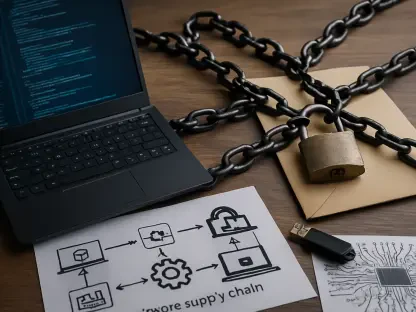In a landmark case that highlights the intricate nature and high stakes of cybercrime in the digital currency era, Ilya Lichtenstein, the mastermind behind the 2016 Bitfinex exchange heist, received a five-year prison sentence from a United States court. The 35-year-old orchestrated an elaborate scheme to steal nearly 120,000 Bitcoin from the Bitfinex exchange, an amount valued approximately at $69 million at the time of theft. The stolen cryptocurrency was funneled into Lichtenstein’s personal wallet through more than 2,000 individual transactions, making it one of the most significant digital heists in history. This case underscores the vulnerabilities within the cryptocurrency domain, the potential for enormous losses, and the rigorous investigative and judicial processes that successfully brought a semblance of justice.
Adding to the case’s complexity, Lichtenstein’s wife, Heather Morgan, faced legal consequences for her role in laundering the stolen cryptocurrency. Morgan, also recognized for her pursuits as a tech entrepreneur and rapper under the name “Razzlekhan,” pleaded guilty to laundering monetary instruments and conspiracy to defraud the United States. The admission brought another layer to the high-profile criminal case, demonstrating the involvement of multiple facets of digital crime and how it extends beyond technical assault to sophisticated money laundering schemes. As the court documents and subsequent admissions revealed, their illegal activities went beyond simple theft, showcasing deep-rooted conspiracies to disguise and reintegrate stolen assets.
The Heist and Its Aftermath
The origins of the Bitfinex heist can be traced back to Lichtenstein’s departure from the marketing analytics firm MixRank, which he co-founded in 2011. Following a “bitter disagreement” with his co-founder, Lichtenstein described his exit from MixRank as a “painful decision.” Despite the emotional and professional challenges associated with his departure, MixRank thrived, earning a spot on the Inc. 5000’s list of fastest-growing companies in the U.S. in 2017 and securing the backing of high-profile investors such as Mark Cuban. The attack on Bitfinex showcased Lichtenstein applying his technical acumen to nefarious ends, escalating from a professional pivot to a criminal endeavor of unprecedented scale.
The prosecution detailed the extensive measures Lichtenstein employed to erase his digital footprints and obfuscate the stolen Bitcoin’s transaction trail on the blockchain. These included sophisticated techniques to avoid detection and advanced laundering methods to conceal illicit gains. Lichtenstein’s involvement with MixRank and subsequent online activities provided a foundation for the heist, demonstrating how personal and professional transitions can morph into cybercrimes under certain circumstances. The meticulous care taken in concealing their activities further emphasizes the intricacy and deliberate planning that characterized this theft, highlighting a need for stronger cybersecurity protocols in digital financial environments.
Arrest and Legal Proceedings
The extensive manhunt culminated in February 2022 with the arrest of Lichtenstein and Morgan. Court documents and a sentencing memo from Morgan’s legal team elaborated on the timeline leading up to their capture. Morgan stated in her defense that she was unaware of her husband’s involvement in the heist until 2020, nearly four years after the fact. At that time, Lichtenstein enlisted her assistance in laundering the stolen Bitcoin. Over the next two years, Morgan adhered to Lichtenstein’s directives, which were so specific they instructed her to avoid internet searches related to their laundering activities, showcasing a well-planned attempt to stay under law enforcement’s radar.
Their laundering operations utilized several diversified tactics to evade detection. These included setting up online accounts with fake identities, automating transactions with specialized software, funneling stolen Bitcoin into dark web marketplaces before withdrawing them, converting Bitcoin into other types of tokens, using cryptocurrency mixer services to obscure transaction origins, and leveraging legitimate U.S. banks to simulate legal financial activities. They also traded some of the stolen crypto for tangible assets like gold coins, showcasing a deep understanding of how to navigate and exploit both digital and traditional financial systems. The variety and complexity of their tactics highlight both the ingenuity involved and the critical need for evolving oversight and detection mechanisms to combat such schemes.
Background and Personal Histories
Morgan’s personal history adds another dimension to her criminal activities. She met Lichtenstein at a tech accelerator, 500 Startups, in 2013. Initially forming a bond with an older Brazilian startup entrepreneur, Morgan’s relationship details remain partially redacted in court documents, although it’s noted the couple was briefly married and lived in Brazil. Her entrepreneurial spirit shone through in 2014 when she founded SalesFolk, an email campaign business. By 2019, Morgan and Lichtenstein married, but her professional achievements were overshadowed by her involvement in the laundering of stolen cryptocurrency.
Currently under house arrest for 33 months, Morgan’s legal team advocates for a sentence equating to time served, reflecting the argument that her involvement was largely influenced by her husband. Her sentencing is slated for November 18, marking another significant milestone in this drawn-out legal battle. Following their guilty pleas, Lichtenstein and Morgan agreed to forfeit all assets tied to the crime, including various cryptocurrency tokens, fiat stored in bank accounts, and gold coins. The overall value of the stolen Bitcoin stands at an astonishing $10.7 billion at today’s rates, underlining the immense financial stakes involved and the far-reaching consequences of their actions.
Cybersecurity Challenges and Government Response
In a groundbreaking case that illustrates the complexities and significant stakes of cybercrime in the digital currency age, Ilya Lichtenstein, who orchestrated the 2016 Bitfinex exchange heist, was sentenced to five years in a U.S. prison. At 35, Lichtenstein executed an intricate plan to steal nearly 120,000 Bitcoin from Bitfinex, valued at around $69 million at the time. He funneled the stolen cryptocurrency into his personal wallet through more than 2,000 transactions, making it one of the largest digital heists in history. This case highlights the vulnerabilities in the cryptocurrency sector and shows the extensive measures taken by investigative and judicial authorities to achieve justice.
Adding to the case’s intricacy, Lichtenstein’s wife, Heather Morgan, faced charges for her role in laundering the stolen Bitcoin. Morgan, a tech entrepreneur and rapper known as “Razzlekhan,” pleaded guilty to laundering money and conspiracy to defraud the United States. Her involvement added another dimension to the high-profile case, revealing how digital crime extends beyond hacking to include elaborate money laundering operations. Court documents and admissions revealed their activities were far more than theft, showing deep-seated conspiracies to conceal and reintegrate the stolen assets.









